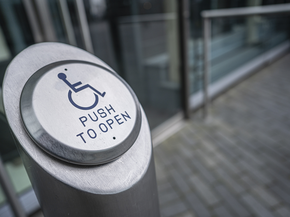
Patient Rights and Responsibilities

Patient Rights and Responsibilities
St. Luke’s employees and healthcare providers will show you respect, maintain your dignity, and make you feel as comfortable as possible while you’re receiving care from us. Good healthcare is a partnership. You have the right to participate in the development and implementation of your plan of care, and we want you and your family to make informed choices in that process. You can help by providing accurate and timely information to your healthcare providers, asking questions, and following your individualized care plan.
Respect and Consideration
Our staff will tell you their names and will call you by your name. We will listen when you have a problem. We will answer your questions. If you do not understand what we tell you, please let us know.
Patients have the right to receive or restrict visitors within clinically necessary or reasonable restrictions. We ask that you and your family show respect for other patients, visitors, and staff, and follow our policies regarding no smoking or other tobacco use, cell phone use, infection prevention, and safety.
Personal Privacy
We will close the door, close the curtains, or ask your visitors to leave the room during an exam. Because St. Luke’s is a clinical education site for healthcare students, they may be involved in your care. If healthcare students are in your room or involved in your care, you have the right to know why.
You have the right to keep your stay in the hospital a private matter. When you’re admitted to the hospital, you’ll be given a choice as to whether others will be allowed to know that you’re in the hospital. Please talk with your family or chosen companions before making this decision. If you choose to keep your hospital stay private, we’ll honor your decision and no one will be told that you’re a patient in the hospital. This means we will be unable to accept any flowers, mail, or telephone calls for you.
If you desire private telephone conversations, you have the right to access the space and a telephone appropriate to your needs, as long as this does not interfere with the care, treatment, and services being provided to you.
Confidentiality
Information about you and your care will be kept confidential (private). Your medical records are private and only you or other authorized people or agencies are allowed to see them. You have the right to see and obtain copies of your medical records. To obtain your records, you’ll need to give us a request in writing. It may take a few days for us to make your medical records available. (Read St. Luke’s Joint Notice of Privacy Practices for more information.)
Notification
When you’re admitted to the hospital, you have the right to have your doctor, a family member, or other companion of your choice notified right away.
Communication (Illness/Injury)
St. Luke’s staff and healthcare providers will tell you about your condition and treatment, and how well your treatment is working. When it’s appropriate, this information will also be shared with your family or chosen companions. If it is not medically possible for you to provide the name of a family member or chosen companion, this information will be shared with an appropriate person on your behalf.
If you require special accommodations for vision, hearing, speech, language, or cognitive disability, please tell the Admitting staff or your nurse and we’ll do everything possible to meet these needs. There is no charge for these services.
Other Types of Communication
When you consent to receive care at any St. Luke’s facility, you also consent to receive communications from us. St. Luke’s will send you communications directly related to your health care, including appointment reminders, test result notifications, patient experience surveys, etc.
You may adjust your communication preferences anytime and specify how you would like to receive these communications (via mail, phone, text message, email, and/or MyChart). Please note that not all preferences may be available for each communication type, and some may be locked to changes.
- Call St. Luke’s Connect for assistance at (208) 381-9000.
- Ask St. Luke’s Clinic staff to adjust your preferences when you check in at your next appointment.
- Update your Communication Preferences in your MyChart account (look for Communication Preferences under Account Settings in MyChart’s main menu).
SMS Terms and Conditions
When you sign up for text messages from St. Luke’s, you are signing up to receive text messages related to your relationship with St. Luke’s. The communications you receive from St. Luke’s may include, but are not limited to, appointment reminders, MyChart account notifications, one-time passcodes, billing notifications, prescription reminders, care management messages, and patient satisfaction surveys. If your health insurance is provided or administered by St. Luke’s Health Plan, you may also receive communications related to paying your premium, claims-related notifications, and member satisfaction surveys.
You can opt-out of SMS messages by texting STOP to the respective short code. Your opt-out request will generate one final message confirming that you have been unsubscribed, and you will no longer receive SMS messages from the short code you opted out from. If you are experiencing issues with a messaging program you can reply with the keyword HELP for more assistance.
You may also adjust your communication preferences via MyChart (view instructions).
Carriers are not liable for delayed or undelivered messages. Message and data rates may apply for any messages sent to you from us and to us from you. Message frequency may vary.
For patients, please see St. Luke’s Privacy Practices, and for insureds, please see St. Luke’s Health Plan Notice of Privacy Practices for more information on how we collect and use information.
Information, Consent, and Decisions About Your Care
You have the right to get information from your doctor about your illness and treatment. This will help you make decisions about your care. Before you have a treatment or procedure that requires your consent, your caregiver will make sure your doctor has answered all your questions about the treatment or procedure. If you have more questions, please tell your caregiver.
You have the right to say “no” to any treatment. If you do not want the treatment, you will be told what could happen to your health as a result. You may be asked to sign a form telling us you do not want the recommended treatment.
You, or when appropriate, your family, will be told about unexpected medical problems or outcomes that have a bad effect on your health or may later have a bad effect on your health.
Discharge Planning
All admitted inpatients are screened by our Case Management staff for discharge needs. If you are admitted to the hospital as an inpatient, you have the right to request a discharge planning evaluation at any time, whether or not you screen as high risk for discharge needs. Upon request, the hospital will arrange a discharge planning evaluation by a qualified staff member.
Research
Research is an important part of finding better treatments. As a patient at St. Luke’s, you may be asked to participate in research or a clinical trial for your illness or treatment. We will tell you about the risks and benefits of participating in the research. We will first get your permission (informed consent) by asking you to sign a form that tells us you understand the research or clinical trial and that we have your permission to proceed. You have the right to say “no” to research or clinical trials. Saying “no” will not affect the quality of the traditional care and treatment you will receive.
Medication Safety
You have the right to know the name of all drugs ordered by your doctor, the dosage, the reason they are being given, and the known possible side effects. To help your caregivers ensure safety, always check to make sure the drug and the dosage are correct. If you believe the drug or dosage is wrong, tell your caregiver. Be sure to tell your caregiver about any other drugs, herbal products, food supplements, or vitamins you’re taking. Also tell your caregiver if you’re allergic to foods, medicine, or other substances.
Equipment Safety
Patients and their family members and visitors should never touch or adjust medical equipment. If you need help, please use the call light.
Pain Management
We want you to be as comfortable as possible. Your caregiver will work with you to control your pain. If you’re in pain, please tell your caregiver.
Security
You have the right to be cared for in a safe setting and to be free from all mental, physical, sexual, and verbal abuse; neglect; retaliation or humiliation; exploitation or harassment from staff, students, volunteers, other patients, visitors, and/or family members. We also expect our patients and their family members to not abuse or harass our employees or any other person at St. Luke’s. Anyone who is abusive or harasses others may be asked to leave St. Luke’s or find care elsewhere.
Protective and advocacy services may be called for free at the following phone numbers:
Child Protection Reporting
1-855-552-5437
Idaho Domestic Violence Hotline
1-800-669-3176
Adult Protection Reporting
1-844-850-2883 (Treasure Valley/Elmore/McCall)
1-800-574-8656 (Magic Valley/Jerome/Wood River)
Office for Civil Rights
1-800-368-1019
Idaho Council on Developmental Disabilities
1-800-544-2433
Restraints and Seclusion
You have the right to be free from restraints and seclusion unless your physician orders restraints and/or seclusion to help keep you or others safe.
Advance Directives
Advance Directives are documents, such as a Living Will, a Durable Power of Attorney for Health Care, or a Declaration for Mental Health Treatment. These documents allow you to name the person you would like to make health care decisions for you and the kind of care you would like, in accordance with Idaho Statutes, if you are unable to tell us your wishes at a later date. You may ask about Advance Directives when you are admitted to the hospital or at any time while you are in the hospital. You have the right to have your Advance Directives included in your medical record, and to have hospital staff and physicians follow your wishes. If you have an Advance Directive, we encourage you to provide a copy to your nurse and discuss your wishes with your physician, in addition to making a copy available for your record.
Beliefs, Values, and Preferences
You and your family have the right to have your cultural, psychosocial, spiritual, and personal values, beliefs, and preferences respected, as long as they do not harm others. If you would like to speak with a hospital chaplain or other member of the clergy, please tell your caregiver. If you have spiritual beliefs regarding specific medical treatments, please discuss these beliefs with your physician.
Non-Discrimination and Program Accessibility
St. Luke’s does not discriminate against any person on the basis of ability to pay for care, age, color, gender, gender identity, medical condition, national origin, race, religion, sex, or sexual orientation. Patients will receive the care they need and everything that is ordered by a physician. In addition, St. Luke’s facilities and all of its programs and activities are accessible to and useable by all.
Code of Ethical Business and Professional Behavior
St. Luke’s has policies to make sure that decisions about patient care are not influenced by monetary arrangements among insurance companies, hospital managers, doctors, employees, or any others who may be involved in patient care.
Concerns Regarding Your Care
St. Luke’s patients are involved in decisions about care, treatment, and services provided. Family members may be involved in the decision-making, with permission from the patient or surrogate decision-maker. Patients can freely voice complaints and recommend changes without being subject to coercion, discrimination, reprisal/retaliation, humiliation, or unreasonable interruption of care, treatment, and services.
If you have concerns or complaints about your care, we will try to address them quickly and fairly. We ask that you discuss your concerns with your caregiver or, if you prefer, with a hospital manager.
If you are not satisfied with the way we answer your concerns, please contact Patient Relations by phone, email, or mail, and we will look into your concerns. Please specify the location where you received services.
St. Luke’s Health System
ATTN: Patient and Family Relations
190 E. Bannock Street
Boise, ID 83712
(208) 381-1420 or 1-800-579-0061
[email protected]
Our goal is to provide a written response to your concerns within thirty (30) days or sooner of receipt. In the event we’re not able to fully investigate and respond to your concern within this timeframe, we’ll communicate any delays to you in writing. Please be assured that we will investigate all concerns and respond as quickly as possible. You may also file your concern independently with:
State of Idaho
Bureau of Facility Standards
PO Box 83720
Boise, ID 83720-0009
(208) 334-6626
[email protected]
Office of Quality Monitoring
Joint Commission
One Renaissance Blvd.
Oakbrook Terrace, IL 60181
1-800-994-6610
[email protected]
Acentra Health
BFCC-QIO Program
1650 Summit Lake Dr., Suite 102
Tallahassee, FL 32317
1-888-305-6759
U.S. Department of Health and Human Services
200 Independence Avenue S.W.
Room 509F, HHH Building
Washington, DC 20201
1-800-368-1019
1-800-537-7697 (TDD)
If you aren’t satisfied with the care provided by your caregiver (doctor, nurse, therapist, assistant), you have the right to ask to be cared for by another doctor from our medical staff or you may ask for a different nurse, therapist, or assistant. We’ll do everything we can to get you a different caregiver, but there may be times when this is not possible.
Billing and Financial Information
As a not-for-profit organization, St. Luke’s maintains an “open door” policy. This means we’ll give you the hospital care you need, even if you can’t pay your bill.
Patient Financial Services staff will help you make arrangements to pay your bill. If you don’t understand your bill, we’ll be happy to explain it to you. Financial assistance programs are available if needed, including access to government programs such as Medicaid and Medicare.
Contact us for assistance with your bill: (208) 706-2333 or 1-800-342-3432
Read our financial care policy
Surprise Billing Protections
When you get emergency care or get treated by an out-of-network provider at an in-network hospital or ambulatory surgical center, you are protected from surprise billing or balance billing. When you see a doctor or other health care provider, you may owe certain out-of-pocket costs, such as a copayment, coinsurance, and/or a deductible. You may have other costs or have to pay the entire bill if you see a provider or visit a health care facility that isn’t in your health plan’s network.
- “Out-of-network” describes providers and facilities that haven’t signed a contract with your health plan. Out-of-network providers may be permitted to bill you for the difference between what your plan agreed to pay and the full amount charged for a service. This is called “balance billing.” This amount is likely more than in-network costs for the same service and might not count toward your annual out-of-pocket limit.
- “Surprise billing” is an unexpected balance bill. This can happen when you can’t control who is involved in your care—like when you have an emergency or when you schedule a visit at an in-network facility but are unexpectedly treated by an out-of-network provider.
You are protected from balance billing for:
- Emergency services: If you have an emergency medical condition and get emergency services from an out-of-network provider or facility, the most the provider or facility may bill you is your plan’s in network cost-sharing amount (such as copayments and coinsurance). You can’t be balance billed for these emergency services. This includes services you may get after you’re in stable condition unless you give written consent and give up your protections not to be balanced billed for these post-stabilization services.
- Certain services at an in-network hospital or ambulatory surgical center: When you get services from an in-network hospital or ambulatory surgical center, certain providers there may be out-of-network. In these cases, the most those providers may bill you is your plan’s in-network cost-sharing amount. This applies to emergency medicine, anesthesia, pathology, radiology, laboratory, neonatology, assistant surgeon, hospitalist, or intensivist services. These providers can’t balance bill you and may not ask you to give up your protections not to be balance billed. If you get other services at these in-network facilities, out-of-network providers can’t balance bill you, unless you give written consent and give up your protections.
You’re never required to give up your protections from balance billing. You also aren’t required to get care out-of-network. You can choose a provider or facility in your plan’s network.
When balance billing isn’t allowed, you also have the following protections:
- You are only responsible for paying your share of the cost (like the copayments, coinsurance, and deductibles that you would pay if the provider or facility was in-network). Your health plan will pay out-of-network providers and facilities directly.
- Your health plan generally must:
- Cover emergency services without requiring you to get approval for services in advance (prior authorization).
- Cover emergency services by out-of-network providers.
- Base what you owe the provider or facility (cost-sharing) on what it would pay an in-network provider or facility and show that amount in your explanation of benefits.
- Count any amount you pay for emergency services or out-of-network services toward your deductible and out-of-pocket limit.
If you believe you’ve been wrongly billed, visit the CMS website or call 1-800-985-3059 for additional information and instructions to dispute charges. You may also contact the Idaho Department of Insurance by visiting the department’s website or calling Consumer Affairs at (208) 334-4319 or toll-free in Idaho at 1-800-721-3272.
Personal Belongings
Please leave valuable items, including jewelry and money, with a trusted individual or in a secure location. If you do bring these types of items to the hospital, please talk with Admitting staff or ask your nurse to have them placed in a secured area (Security Department or hospital safe).
Your nurses and other caregivers are here to assist in meeting your medical and support needs. That’s why we ask patients and their family members, or chosen companions to keep track of personal belongings such as clothes, dentures, hearing aids, and eyeglasses. Please let your nurse know as soon as possible if any personal item is missing, and every effort will be made to find it. We’re sorry that St. Luke’s cannot replace lost or damaged personal property.
Visitation and Support
Visitation of patients is an extremely important aspect of St. Luke’s “family-centered care” philosophy. Visitation depends on the patient’s condition, the activity of the unit he or she is on, the prevention of infection, and at the discretion of the healthcare team. St. Luke’s strives to ensure designated visitors enjoy full and equal visitation privileges consistent with patient privileges and will not restrict, limit, or otherwise deny privileges on the basis of race, color, national origin, religion, sex, gender identity, sexual orientation, or disability.
You have the right to consent and decline visitation without discrimination and to designate an individual for the following categories:
- Patient representative: a representative who is legally responsible for making medical decisions on the patient’s behalf.
- Support person: a family member or chosen companion, friend or other individual who supports the patient over the course of their hospital stay. The support person may visit the patient and may also exercise a patient’s visitation rights on behalf of the patient, with respect to other visitors, when the patient is unable to do so.
- Essential caregiver: a person designated by a patient or resident to visit the patient or resident at a facility (e.g., a hospital, skilled nursing facility or rehabilitation health setting).
Patient Responsibilities
In addition to the preceding rights, you must accept certain responsibilities in order to receive maximum benefit from your stay at St. Luke’s.
You are responsible:
- For providing, to the best of your knowledge, accurate and complete information about present complaints, past illnesses, hospitalizations, medications, and other matters related to your health.
- For reporting your perceived risks in your care and/or unexpected changes in your condition.
- For participating in the formation of your treatment plan and for following the plan for care, service, or treatment as prescribed.
- To express any concerns you have about your ability to follow and/or comply with the prescribed treatment plan.
- For asking questions when you don’t understand what you’ve been told or what you’re expected to do.
- For the consequences and outcomes, if you don’t follow the care, service, or treatment plan.
- To communicate with healthcare providers about your pain management, help healthcare providers measure your pain, and report pain and the effects of pain management interventions to your caregivers.
- For being considerate and respectful of the rights of other patients and staff, and of the property of others and the hospital.
- For following the rules and regulations of the hospital concerning patient care and conduct. Please help us control noise and disturbances, and follow the policies regarding no smoking, cell phone use, infection prevention and safety.
- For promptly meeting any financial obligations agreed to with the hospital.
Additional Information

Accessibility
St. Luke’s is committed to ensuring equitable access to care.

Service Animals
Service animals are welcome—we recognize the vital role they play for our patients and visitors.
Safety
We will partner with you and your loved ones to deliver exceptional care and a physically and psychologically safe care experience.